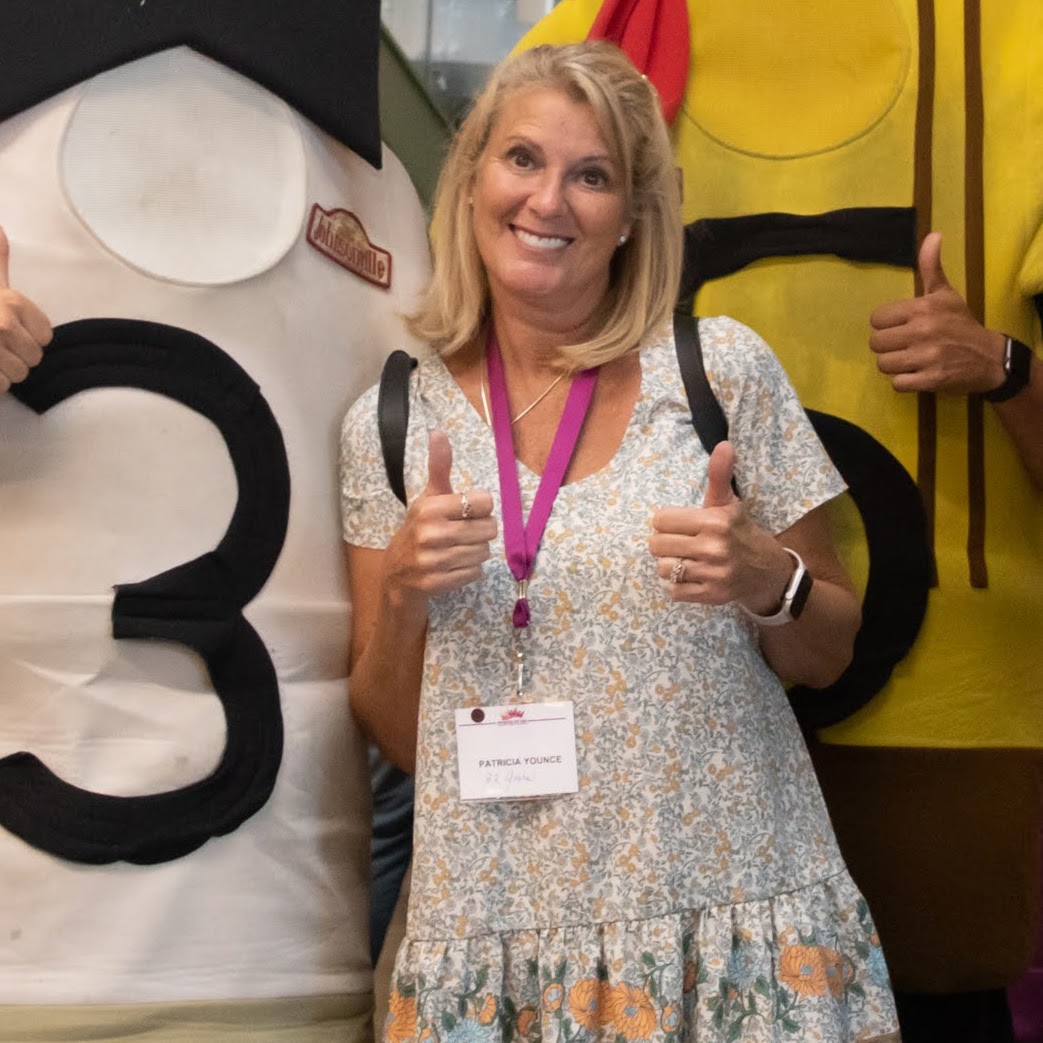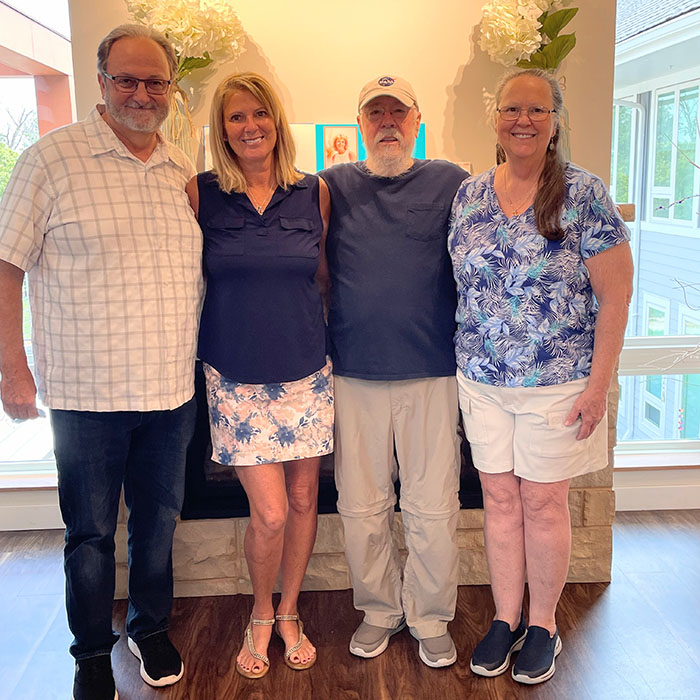

PATTY YOUNCE: ORIGINALLY DIAGNOSED IN 2001, SHE IS NOW A 22-YEAR SURVIVOR
Written By: Julia Brabant
September 2023
Date of Diagnosis: October 2001
Current Status: No Sign of Active Cancer
A 22-Year Pancreatic Cancer Survivor, Patty Younce Saw 5 Doctors Before Getting the Right Diagnosis
The number of long-term pancreatic cancer survivors in America is growing, and Patty Younce is living proof. It’s been almost 22 years since doctors diagnosed Patty with the disease, but had it not been for her own persistence, she might not have gotten that diagnosis at all.
In October of 2001, Patty, who lives with her husband, Mike, outside Orlando, Florida, developed a sudden, intense itchiness in her feet. By the following day, she felt the same itchiness in her palms, and by day three, it was affecting her entire body.
Several coworkers commented that Patty’s eyes had a yellowish hue, which is often an indication of jaundice. She’d also begun losing weight, but she’d been dieting at the time and didn’t see the significance of that until later.
Patty saw her general practitioner, who said she was dealing with dry skin and recommended she try a topical solution. Dissatisfied, Patty sought opinions from three more doctors, all of whom concurred with the “dry skin” diagnosis. Frustrated, Patty and her husband thought her symptoms might be the result of allergies and scheduled a visit with an ear, nose and throat doctor to get yet another opinion.
It was the ENT who first believed something more significant was going on and directed Patty to the local hospital for tests.
“The doctor walked in and said, ‘I have the worst possible news I can give you. You have pancreatic cancer,’” Patty said.
The doctor also expressed surprise at the diagnosis, noting that most people diagnosed with pancreatic Cancer were “65-year-old men.” Patty was just 42.
Floored, she and her husband had little time to digest the news before getting down to business. They began interviewing doctors throughout the Orlando area but couldn’t find one with significant experience performing Whipple surgeries, a common treatment option for patients whose pancreatic cancer has not yet metastasized.
Patty’s brother, Bob, who worked as a nurse, urged Mike and Patty to find someone who performed Whipple surgeries on a regular basis. They found a few surgeons who had performed six or so such procedures a year in Florida but agreed with Patty’s brother about finding someone with more experience given the complex nature of the operation.
Patty and Mike learned about Dr. Douglas B. Evans, M.D. then of the MD Anderson Cancer Center in Houston, Texas. They flew out to meet him, and Patty soon underwent the Whipple.
The surgery was a success. While there are always lifestyle adjustments that follow a Whipple, Patty remained cancer-free for 10 years after the operation before a scan showed signs of a cancer recurrence. At this point, Dr. Evans had moved to Froedtert & the Medical College of Wisconsin in Milwaukee, and Patty decided to follow him there, working with a medical team that included oncologist Dr. Clark Gamblin, M.D.
Patty’s follow-up scans had revealed three spots on her liver, prompting her care team to recommend she try chemotherapy to shrink the tumors. The chemo had little effect, so Dr. Gamblin performed a resection of the liver, removing 65% of the organ.
That procedure, too, was successful. Patty continued to travel to Milwaukee periodically for scans from 2011 until 2018, and when all of those were clear, she began having them locally. Currently, she has scans every eight months to monitor her condition.
In the years since her first and second diagnoses, Patty has had time to reflect on some of her earlier symptoms that now hold more significance than they did at the time. She recalled having mild back pain even before developing itchiness. She also felt periodic pain under her ribs, which she now thinks was likely a result of the cancer.
Patty has also gotten to know a few people with pancreatic cancer over the years. Last December, an old friend of Patty’s daughter looked Patty up on a neighborhood app after finding out that a fellow community member had received a pancreatic cancer diagnosis. Patty reached out to the patient’s wife, Linda, and the two families became close virtually, with Patty recommending Ray see Dr. Evans in Milwaukee for care.
Ray and his wife, Linda, heeded that advice, and Patty, Mike, Linda and Ray met face-to-face for the first time at the Power of Us annual fundraiser for the Seena Magowitz Foundation in Milwaukee, where Dr. Evans was also in attendance.
“The whole thing was so positive,” Mike said of the experience. “It was truly about celebrating. I can’t wait to go again.”
Patty also had a chance to meet other long-term survivors, both at the 2023 Seena Magowitz Foundation Power of Us event and through the Foundation’s S.O.S. Support Group, a virtual support group that unites pancreatic cancer patients and survivors from around the world.
“It’s great to be able to ask questions and share stories and experiences,” Patty said. “It was the first time I could talk about the Whipple surgery with people who understand.”
Based on her own experiences, Patty encourages anyone facing a serious diagnosis to seek support from others who’ve faced similar hardships.
“Reach out to someone who’s gone through it,” she said. “It’s easy to feel like you’re all alone in this club, but you’re not.”
She also urges people facing serious diagnoses to go where the experienced professionals are and seek out the best possible care they can find for their conditions.
“It’s so important to be persistent and stay educated when it comes to your diagnosis,” she said, recalling how many different doctors she had to see before getting a correct one. “I feel so blessed to have been put in the hands I was put in.”
Mike also believes general practitioners must do more to identify patients with pancreatic cancer at the earliest possible stages, when the cancer is more likely to be treatable.
“The misdiagnosis issue has got to be fixed,” he said, noting that months passed between when his wife initially sought treatment for symptoms and when she finally got an accurate diagnosis. “The medical industry has to do a better job in diagnosing this disease.”
Some of the problem he attributes to a lack of knowledge about pancreatic cancer, both among medical professionals and patients.
“When doctors tell the diagnosis of just having dry skin, you want to believe them,” he noted. “Doctors need better training and more education about what symptoms to look out for, and patient awareness of these symptoms has to increase, too.”
Mike also said that while he, personally, didn’t have that hard of a time stepping into a caregiver role following Patty’s diagnosis, it is a role that tests your resilience and emotions.
“If I was a writer, I’d write a book called ‘Recovery is a Rollercoaster,’” he said. “You get so high on one diagnosis or test result and then you get 10 more in a week. With good information comes bad information, and you just have to stay on top of it and stay positive.”
According to Patty, he’s done an exceptional job as a caregiver despite the inevitable challenges that come with the role.
“He’s my rock,” she said. “When you’re the patient, you kind of fall into ‘sick mode’ and need someone who can help you manage everything. My husband never left my side.”
Patty has shown no sign of cancer since 2011.



